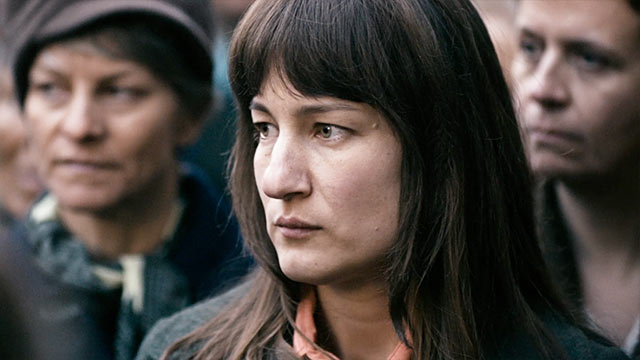
THE DIVINE ORDER (Die göttliche Ordnung)
Zeitgeist Films
Director: Petra Biondina Volpe
Written by: Petra Biondina Volpe
Cast: Marie Leuenberger, Maximilian Simonischek, Rachel Braunschweig, Sibylle Brunner, Marta Zoffoli
Screened at:Critics’ link, NYC, 9/8/17
Opens: October 27, 2017
In my next life I’d like to be born in Switzerland. Every movie filmed there makes the country look like paradise. Just think: no terrorism, no military actions since the Sonderbund War of November 1847—and that was a within the current borders of the country and not against a foreign power. Great for skiing, even for driving through the beautiful Alps. Yet, lots of women were unhappy, at least before 1971, when they did not have the right to vote in federal elections. Wait: how did we get sidetracked and talking about Saudi Arabia? No, believe it or not, Switzerland. Kinder, Küche,Kirche—Children, kitchen, church. That’s not all: women could not work without their husband’s consent. In Europe only Lichtenstein women could not go to the polls until 1984.
There’s always room for a documentary on the suffrage movement, but a narrative film can be so much more entertaining and even more insightful. “The Divine Order” is the one to top, eschewing a nationwide story in favor of concentrating on just one small town within striking distance of Zurich. Just as in the U.S. where rural areas are generally more conservative than urban locations and more likely to vote Republican, the folks in the German-Swiss village are tradition bound, but the upcoming 1971 referendum made women’s suffrage (not immigration or terrorism) the principal source of political discussion. One can safely assume that though only men could take part in the referendum which would give women the right to vote, the citizens of cosmopolitan cities like Zurich and Geneva would be more likely to vote yes than those in the countryside. That’s just the way things are, not only here in the U.S. but in most countries in the world.
Yet lo and behold, a single voice can change the results even in that village. Let by one Nora (Marie Leuenberger), so-named to remind us of the liberated Nora in Henrik Ibsen’s “A Doll’s House,” the women come around to think of their political future, almost a miracle considering that the women were as likely as the men to oppose liberation. As the story unfolds, “Die göttliche Ordnung” (the original, Swiss-German title) finds that women in the town become concerned not only with voting rights but with other conditions of the fair sex, including, at least in Nora’s case, with the right to have an orgasm. (Nora never experienced this, though a meeting led by a Swedish woman would coax her and others to look with pocket mirrors at their labias, noting whether these were in the shape of a tiger, or a fox, of what-have-you, leading the good folks to blush but to go ahead and inspect).
Emphasizing the women’s limited rights is the case of Nora’s niece Hanna (Ella Rumpf), sent to prison because she stayed out all night smoking weed with a biker her parents disliked. For his part Hans (Maximilian Simonischek), Nora’s handsome husband, has been made department manager in his firm, which makes him all the more likely to forbid his wife to work—which he legally could do. Though he tells Nora that he approves of women’s right to vote, he cannot express this wish in the presence of the men he works with for fear they would ostracize him and no longer respect his leadership role. As for women, the so-called Anti-Politicization of Women Committee joins the men in urging the defeat of the referendum, its leader, the Swiss variation of our own National Association Opposed to Women’s Suffrage, formed in 1911 and called “remonstrants.”
Discussions rise to fever pitch when women, led by Nora and the elderly Vroni (Sibylle Brunner), the latter fashioned on our own Betty Friedan, calls a strike, meeting and staying for days in an Italian restaurant while their men are forced to cook, clean and sweep and presumably do whatever they might do when their wives are not around. (Surprisingly, when the strike is called, nobody suggested that the rebels become familiar with Aristophanes’ Greek comedy “Lysistrata” written in 411 B.C. in which women refused their men sex until they ended the Peloponnesian War.)
Director Petra Volpe knows how to move the plot cautiously forward so that when most women, at first hesitant, come around to Nora and Vroni’s point of view, the transformation is earned. We can believe that women can become radicalized by appealing to both intellectual reasoning and examinations of their labias. The film is ever so much more entertaining than (I would imagine) a documentary on the suffrage movement would be as it focuses on a village small enough for us in the theater audience to identify individual women and men and to root for those who want nothing more than equal rights for both genders.
In Swiss German with English subtitles. The film is Switzerland’s candidate for Oscar consideration.
Unrated. 96 minutes. © Harvey Karten, Member, New York Film Critics Online
Comments, readers? Agree? Disagree? Why?
Story – A-
Acting – A-
Technical – B+
Overall – A-





